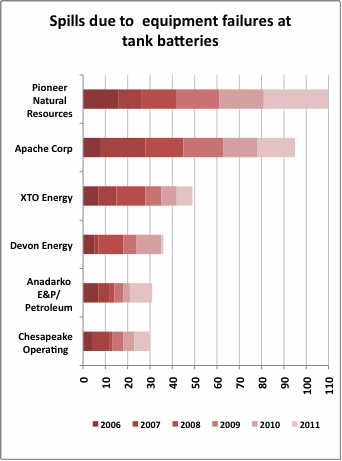Texas Railroad Commission – Inadequate enforcement means irresponsible oil and gas development
The Railroad Commission of Texas (RRC) – the state agency with primary regulatory responsibility for the oil and natural gas industry – has the dual role of maximizing development of oil and gas while also protecting public safety and the environment.
According to the Sunset Advisory Commission of Texas (“Sunset Commission”), “Unregulated production of oil and natural gas can detrimentally affect the environment and significantly hinder future product recovery efforts.”
RRC data indicate that enforcement of oil and gas rules by the RRC is not keeping companies from damaging the environment. Between January 2006 and the end of 2011 there were more than 4,500 spills of crude oil and natural gas products. Close to six percent (266) of spills during this period affected water.
Could enforcement efforts have prevented some of the spills? We looked a subset of spills to dig into this question. Spills occur at a variety of oil and gas facilities: tank batteries, pipelines, flowlines, valves, pump stations, and others.
We found that more than half of the spills (57%) between 2006 and 2011 occurred at tank batteries. Of the spills at tank batteries, some were probably not avoidable (e.g., caused by “Acts of God”). But close to half were caused by “equipment failure”[5], which presumably, with adequate maintenance and attention by the operator, may have been prevented.
Click chart for larger version
This chart shows that year after year, numerous operators have crude oil and natural gas product spills from tank batteries due to “equipment failures.” These types of spills often contaminate soils, create wastes that require proper disposal, and may contaminate water resources. Between 2006 and 2011, 45 spills caused by equipment failure at tank batteries affected water.
As seen from the chart, between 2006 and 2011 six operators each had more than 30 incidents leading to crude oil and product spills at tank batteries. Pioneer Natural Resources had 29 spills in 2011 alone, and over the six-year period had 110 spills due to equipment failures at tank battery sites.
The pattern of repeated problems at tank batteries strongly indicates that the RRC has not done enough to encourage or require companies to prevent pollution at these sites.
Overall, our review of publicly available RRC enforcement data shows that Texas RRC’s capacity to regulate the oil and gas industry has been, and remains, limited:
- Inspections are decreasing despite additional staff
- Violations remain high, and repeat offenders are not deterred by current enforcement actions
- Enforcement tools such as severances are not being used effectively
- Minimum and maximum penalties are too low to deter would-be violators
- RRC should increase transparency of enforcement data, and encourage greater citizen participation in enforcement



